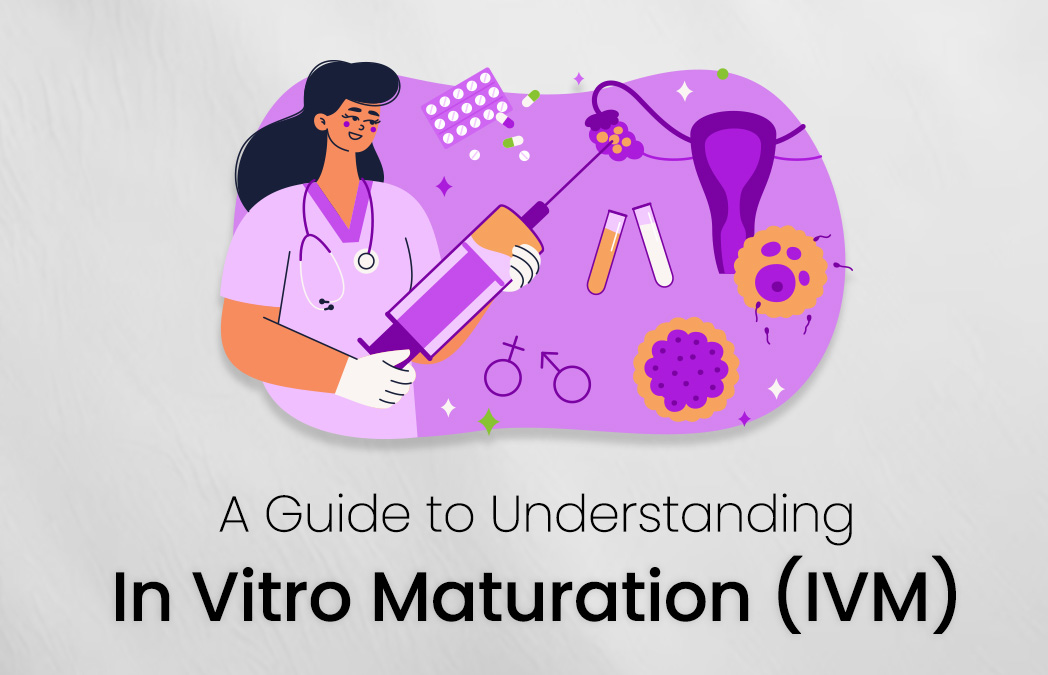
A Guide to Understanding In Vitro Maturation (IVM)

Are you looking for fertility treatment options that meet your personal and medical needs? In Vitro Maturation (IVM) may offer a promising alternative. Distinct from In Vitro Fertilization (IVF), IVM allows eggs to mature outside the body, reducing the need for intensive hormone treatments and offering a gentler approach to assisted reproduction. This guide covers everything you need to know about the in vitro maturation process, detailing its stages, benefits, and the ideal candidates for this procedure. Whether you are looking to start a family or preserve your fertility for the future, understanding how IVM works can help you make an informed decision.
What is In Vitro Maturation (IVM)?
In vitro maturation – IVM stands as a less invasive fertility treatment compared to traditional IVF. Here’s a step-by-step breakdown of the in vitro maturation process and its distinct advantages:
A Step-by-Step Overview of the IVM Procedure:
Initial Assessment:
Potential candidates undergo a thorough medical evaluation to ensure that the IVM procedure is suitable for them.
Egg Collection:
Unlike IVF, where oocytes are collected after reaching maturity, IVM collects eggs while they are still immature. Eggs are collected transvaginally using a fine needle, typically under ultrasound guidance.
In Vitro Maturation of Oocytes:
Collected eggs are cultured in nutrient-rich media that prompt their maturation.
Maturation in the Lab:
These collected eggs are then matured in a controlled laboratory environment, a process that typically takes about 24 to 48 hours.
Sperm Collection:
A sperm sample is collected from the male partner.
Fertilization:
Post maturation, these eggs are fertilized using sperm, mirroring natural conception.
Embryo Development:
Fertilized eggs develop into embryos in the laboratory over a few days.
Embryo Transfer:
One or more healthy embryos are transferred to the uterus.
Benefits of IVM Procedure
In vitro maturation comes with several significant benefits:
Minimal or No Ovarian Stimulation:
Unlike IVF, which requires significant ovarian stimulation to mature eggs, IVM typically requires minimal or no stimulation.
Decreased Risk of OHSS:
As minimal stimulation is needed, the risk of developing ovarian hyperstimulation syndrome is substantially lowered.
Fewer Injections:
The reduced need for hormonal drugs also means fewer injections, making the process less invasive and less physically demanding.
Shorter Treatment Cycles:
The entire IVM cycle is shorter compared to IVF, often completed within two weeks.
Cost-Effective:
Generally, IVM is less expensive due to lower medication costs and fewer doctor visits.
Considerations for IVM in India
While the benefits of IVM are compelling, it is not a suitable procedure for everyone. Here are some key considerations:
Age and Egg Quality:
IVM is best suited for younger women with more viable oocytes.
Underlying Health Issues:
Conditions like severe male factor infertility may affect the success rates of IVM.
Medical Assessment:
A comprehensive health evaluation is crucial to determine if IVM is the most suitable treatment option.
Suitable Candidates for IVM:
Women with Polycystic Ovarian Syndrome (PCOS):
IVM is particularly beneficial for women with PCOS as it minimizes the risk of ovarian hyperstimulation syndrome.
Young Women with Cancer:
Prior to undergoing chemotherapy or radiation, which can affect fertility, young women can opt for IVM to preserve their oocytes.
Women Averse to Hormone Treatments:
Those who prefer not to undergo extensive hormone treatments may find IVM a suitable alternative.
Factors Influencing Outcomes
Several factors influence the effectiveness of the IVM procedure:
Age:
Younger women usually have higher success rates due to better egg quality.
Fertility Health:
Conditions such as endometriosis or previous ovarian surgeries may complicate the in vitro maturation process.
Egg and Sperm Quality:
The genetic integrity of the eggs and sperm play a critical role in the success of the embryos.
Preparing for IVM Procedure
Preparation for IVM involves physical, nutritional, and psychological readiness such as:
Lifestyle Changes:
Ceasing smoking and reducing alcohol intake can significantly improve treatment outcomes.
Nutritional Considerations:
A balanced diet rich in vitamins and minerals supports oocyte health.
Mental Health:
Stress management and emotional support are vital, as fertility treatments can be psychologically demanding.
Wrapping It Up
In Vitro Maturation (IVM) is a great alternative to traditional fertility treatments, especially if you have certain health issues or want to avoid heavy hormone use. Getting to know the IVM process helps you set realistic expectations and make choices that are best for your reproductive health. With its distinct advantages, IVM is not just another medical procedure—it is a promising option for many who are eager to begin their journey to parenthood.


fill up the form to get a
Free Consultation
Avail 0% interest on EMI
All Procedures | No Upper Limit
Frequently Asked Questions
What is the IVM treatment?
What is the cost of IVM treatment in India?
What is CAPA-IVM by Oasis Fertility?
How we reviewed this article:
- Current Version
- July 26, 2024 by Oasis Fertility
- May 22, 2024 by Oasis Fertility
- May 21, 2024 by Oasis Fertility



